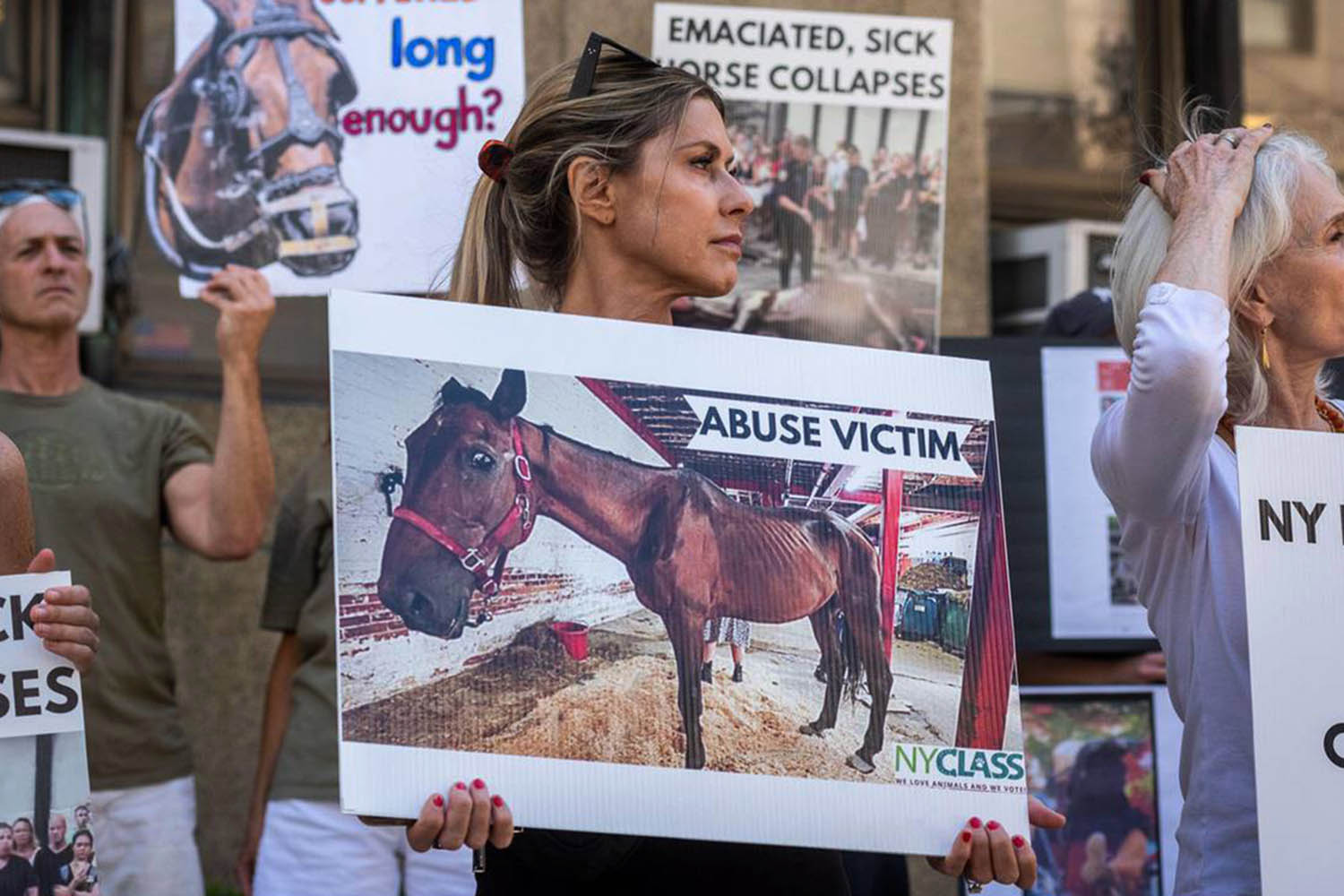Odds are, unless you’re an animal activist, you won’t have heard of Ryder. The 26-year-old bay gelding pulled a tourist carriage in New York City until one steamy hot August day in 2022, when he fell down in 9th Avenue. As mounted cops poured ice on his bony, prostrate body, passers-by filmed his plight and Ryder became a cause celebre, a symbol of the cultural fault line over animal welfare.
Did he trip or did he collapse from overwork? His owner, Ian McKeever, became the city’s first carriage driver in 150 years to stand trial for animal cruelty. A few days ago, on 21 July, unexpectedly, McKeever was cleared. Despite the thinness of the horse, and the fact that McKeever had claimed Ryder was only 13, the jury was swayed by the fact the horse had undiagnosed leukaemia. He was euthanised two months later.
McKeever, 57, who grew up with horses in Ireland and had driven New York City carriages for nearly 40 years, wept in court and claimed no one loved them more. His lawyer said the case was driven by politics not evidence. The animal activist group NYClass, citing animal protection as a social justice issue, had launched Ryder’s Law to phase out horse-drawn carriages in the city.
The high-profile verdict came just as the year-long ban on British Olympic dressage rider Charlotte Dujardin for excessive whipping was lifted, leaving her free to compete again.
What’s fascinating is that the two scandals represent polar opposites in the horse world – the grind of former farm horses hauling tourists around Central Park versus the elegance of cosseted, million-pound dressage horses – but are in fact about exactly the same thing: using animals for financial gain.
Hundreds of thousands of people, breeding and selling, transporting and training, cleaning and managing, make a living in tourism and equestrian sport. Millions more enjoy the entertainment.
But how acceptable is it? Inexorably, animal welfare is ascendant. Hunting and greyhound racing are all but gone. Beach donkey rides too. Fishing is criticised. Tourist carriages have vanished from most cities. Olympic pentathlon has removed horse-riding after an embarrassing video. Little wonder that across the western world equestrian sports are paranoid. Horse racing, a deeply traditional industry, is pursued by activism; eventing is softening courses; and the dressage world Dujardin rejoins is policed by activists with cameras. Will Olympic horse sport survive?
At grass roots Pony Club, language is changed: you use your leg to encourage the pony, you never kick. Spurs and sticks are restricted. There’s even a grim Social Licence achievement badge for the kids. Q: What could happen if horse sports lose their social licence? A: Riding ponies could be stopped by law.
Logic doesn’t flourish here, hence the increase in sometimes rather cruel halal and kosher slaughter and over-intervention by vets to prolong pets’ lives
Logic doesn’t flourish here, hence the increase in sometimes rather cruel halal and kosher slaughter and over-intervention by vets to prolong pets’ lives
The norms of public acceptability, once based on tradition and animal welfare science, are shifting rapidly with social media. Sentiment, that most first world of indulgences, now demands we treat animals as “fur babies”. Activists go further and grant them equal moral rights, which, logically, would mean no longer using them for entertainment (ban that village terrier race now!) and removing dominance and restraint (no dog leads, no bridles!).
But logic doesn’t flourish here, hence the increase in sometimes rather cruel halal and kosher slaughter, the over-intervention by vets to prolong pets’ lives, the dogs driven crazy by unnatural environments. Care can be misguided. With animals, caring too much is as cruel as caring too little.
Newsletters
Choose the newsletters you want to receive
View more
For information about how The Observer protects your data, read our Privacy Policy
There is cultural push back. In America, Ryder’s driver has blue-collar union support, and brave is the activist who would separate the cowboy from his horse, the hunter from his guns. In the UK, protests against the Grand National appear counter-productive, suggesting that, for the meantime, the social licence among the racegoing public is unbroken. But this is a political issue that isn't going away.
Melanie Reid is tetraplegic after breaking her neck and back in a riding accident in April 2010
Photograph by Sipa US via Alamy

